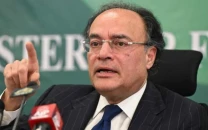Pharmaceutical downfall
The healthcare budget must always be flexible enough to cope up with such untoward happenings

Pakistan needs updated policies, upgraded standards and advanced surveillance mechanisms, along with a firm financial support by the government, for production, provision and storage of quality medications in affordable prices throughout the year.
The current pharmaceutical downfall in Pakistan has seriously affected pharmacists and other individuals affiliated with this important sector. The confiscation of 48 million hoarded tablets of a leading brand of paracetamol from a warehouse during the era of its active ingredient scarcity has raised questions amongst the public on the check-and-balance mechanism of medicine supply in the country. Despite the concerned federal minister claiming no shortage of this particular brand of paracetamol, common people were seen arguing at pharmacies over non-availability or sale at far higher prices.
The basic healthcare needs are going beyond the reach of the common man in Pakistan because the current spending on healthcare in the country is merely 3% of GDP. The most running, commonly prescribed and even life-saving medicines are gradually vanishing from the pharmaceutical market because of no control on the price of their raw materials. Besides this, the import of active pharmaceutical ingredients and excipients is badly affected due to the huge gap in the values of the dollar and the rupee. A reciprocal relationship is growing at a faster pace between the quality of existing medicinal products and their costs.
Despite the clear recommendations from the WHO to spend at least 6% of the GDP on healthcare, the budget allocated by the Government of Pakistan to National Health Services for the year 2022-23 is eight times lesser than in the year 2021-22. The reason stated by the government for this fall in the budgetary allocation was that the equipment, medications, vaccines and other treatment essentials for Covid-19 are currently less in demand due to the decline in cases of coronavirus as compared to the last year. But the point to ponder is that this budgetary allocation for healthcare had no compartment for the unanticipated expenditures on public health due to the sudden outbreak of any disease or natural calamities. Diseases are always uninvited just like natural disasters such as cyclones or floods.
Thus the healthcare budget must always be flexible enough to cope up with such untoward happenings. After the recent horrible flood in Pakistan, many hidden truths regarding the actual situation of healthcare in Pakistan have become evident and pharmaceutical sector faced crisis. The flood-affected individuals were, for obvious reason, prioritised for provision of medication and healthcare facilities by the government, pharmaceutical industry and NGOs, but that caused shortage of medication for patients across the country due to their limited stocks.
It is high time for the government to lend their firm financial support to the pharmaceutical sector as many pharmaceutical industries have limited their production of medicines and other healthcare products. Moreover, the budgetary allocation must be tensile enough to cater to the basic healthcare needs of the nation throughout the year, also accounting for any untoward medical emergencies and natural disasters. Certain strategies must be developed and implemented immediately by the concerned authorities to combat the issue of raw material prices that is arising due to the rising trade gap as well as the weakening rupee. The Drug Regulatory Authority of Pakistan, DRAP, must come forward and focus on approval of quality pharmaceutical products on affordable prices. The check and balance on the production and storage of medicines is also necessary, warranting implementation of updated policies and upgraded pharmaceutical standards.
Published in The Express Tribune, October 20th, 2022.
Like Opinion & Editorial on Facebook, follow @ETOpEd on Twitter to receive all updates on all our daily pieces.















COMMENTS
Comments are moderated and generally will be posted if they are on-topic and not abusive.
For more information, please see our Comments FAQ